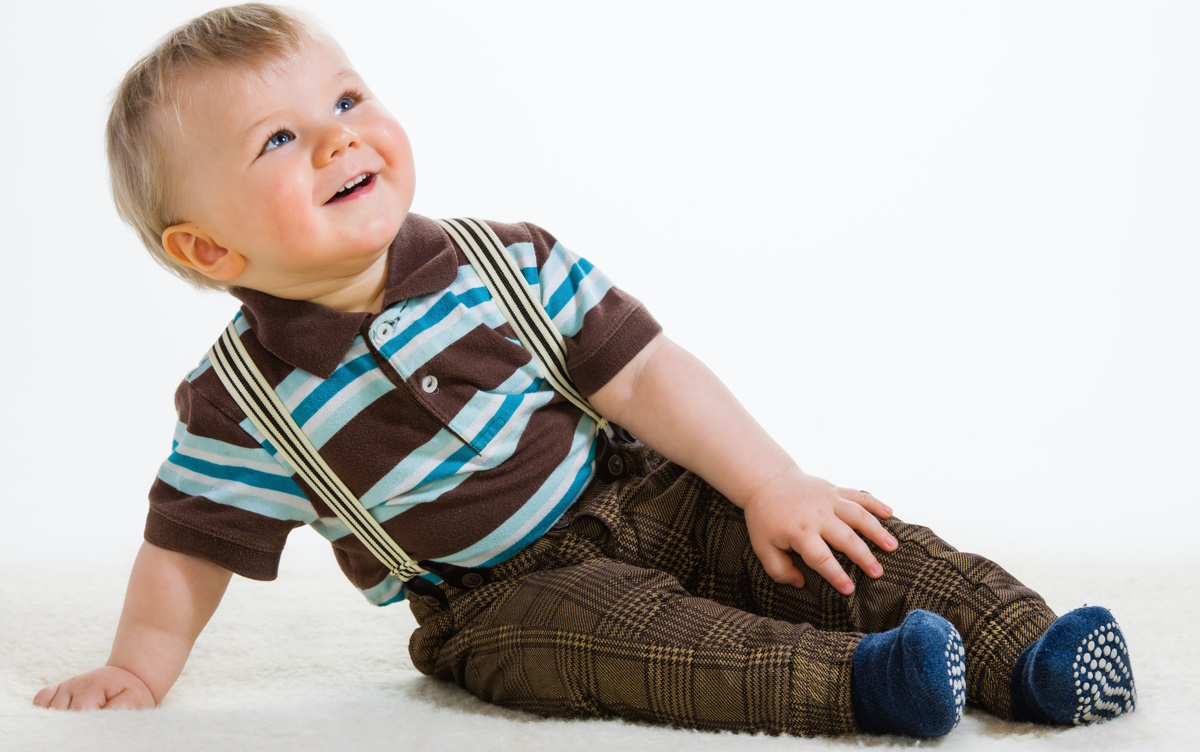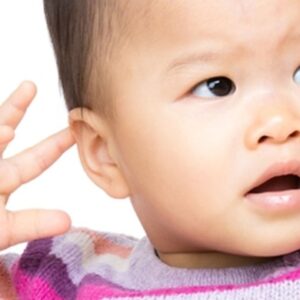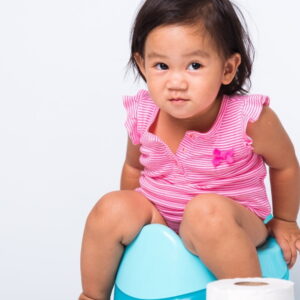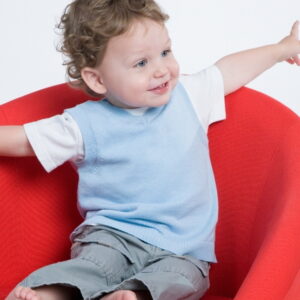“My 1 year 3 month baby can’t talk or walk. He always cries. Is all this normal?”
Here, we take a look at all the different behaviors a dad asks about to see if his 15-month-old baby appears to be developing normally.
Dad’s Question:
My 1 year 3 month baby can’t talk or walk.
He can talk but not to us only when he is on his own, and then it’s more like baby noise’s babababa etc. He can feed himself and use beakers. He always cries, and I have only just noticed his hands shake. After a little bit of food, he throws it and screams till we feed him. He also still uses a pacifier.
He has an older sibling that I think started to talk earlier.
Is any of this normal?
Daniel
Normal 15-Month Baby Development and When to Worry
Hi Daniel, you have several concerns regarding your toddler’s development, so let’s go through them one at a time!
Toddler Walking Development
Don’t worry; it sounds like your son is pretty normal in terms of walking. Many babies don’t walk until 18 months or so. Some walk very early, there really is a big range. (You can take a look at our baby walking poll here.)
Many toddlers do start walking on their own at around 12-15 months, but it is completely normal that they start between 15 and 18 months too. And even if it takes until after the age of 18 months, it doesn’t have to mean that there is something very wrong, it just means that the toddler is late in walking compared to the average baby.
So the fact that your 15 month baby can’t walk is not something to be worried about!
How to stimulate a toddler’s walking
Your toddler will start walking when he is ready, but if you want to stimulate this development a little bit, there are a few things you can do.
First of all, make sure he has lots of opportunities to get to furniture and pull himself up and walk around the furniture.
Take him for walks by holding both hands and give him lots of praise for trying.
You can buy a foam ball and place the ball next to his feet while he is standing up, holding onto some furniture, or actually cruising around. He might then kick the ball accidentally or does it because he wants to, and you can start playing together with him cruising around, and you fetch the ball and let him kick it again. This way, he will practice his balance in a fun way!
Another thing is to have him sit on a low baby-sized stool as much as possible to strengthen his back. It doesn’t have to be something advanced.
Maybe he can sit there while watching TV, or you play together. If you want to practice speech development (we get to that, too), you can ask him to pick toys or things from the floor while he is sitting on the stool so he has to reach down and out to get the toys! (But this can only be done safely if the stool is low enough for him to be able to sit with his feet on the floor. )
Speech development at 15 months
With talking, he is just at the age of babbling. This is normal, and you can read more about toddler speech development milestones in this Q&A.
At 15 months, most babies can say a few words, like, for example, mommy, daddy, no, more, look, dog. Some babies have already started to combine words into mini-sentences, while others say practically nothing. It really varies. At this age, babies tend to understand a lot more words than they actually say.
So to answer your question, yes, your son’s babbling is perfectly normal. He will start to have some words, like Mama, Daddad, maybe drink, or wawa for water. Your son may be one of those children who suddenly launches into talking, and you won’t be able to shut her up!
You mention that his older sibling talked earlier. This is actually quite common because they are getting lots more one on one attention. The next baby often observes more but not having so much interaction.
Many parents also experience that the second baby is fully occupied with trying to learn how to move around quickly enough to follow what the older sibling is doing, so they are earlier with crawling or walking but later with talking.
When did your son start to crawl? Most babies start to crawl between 6 and 10 months, so if he was relatively early with that, it could be that walking is simply too slow for him to follow his older sibling around!
Some parents also notice that the older sibling is so tuned in with the younger one that the younger barely has to say anything that even sounds like words before the older one knows precisely what the younger means!
Stimulating speech development in Toddlers
Just like with his walking, you will notice a lot of development in the coming months. He will start to have more words for familiar things over the next few months.
It takes a lot longer to actually have recognizable sentences, but he will start to chat with you and he knows what he means, even if it sounds like nonsense to you. He will understand a lot more than he can articulate.
The more you talk to him, making eye contact so he can see your mouth and face, and show him how to say words for familiar things, the sooner he is likely to try to imitate what you do.
Also, make sure you use adult language when you talk to him so he has a chance to listen to the proper words for things.
Have lots of conversations and tell him what you are doing. Babies are like a sponge and absorb everything around them – including words we would prefer they didn’t! Read more about helping your toddler talk here.
If he enjoys music, you can see if you can find some baby music classes nearby. Some babies enjoy singing and listening to simple songs, and this stimulates speech development too!
One thing I would do, too, is to limit the pacifier. There is quite a bit of evidence that babies that use a pacifier a lot don’t develop speech so early.
This is, of course, mainly an issue if he uses the pacifier a lot while awake, more like a habit rather than for soothing.
Learning to talk is also connected with a degree of frustration – trying to communicate their needs. Babies who have a pacifier popped in their mouth most of the day or as soon as the grizzle doesn’t learn to try harder; they get some comfort but are learning to suck for comfort instead of interact. Of course, it all depends on how much you use it, but I would try to limit it to just sleep times now.
Toddler tantrums – normal or not?
I am sure you are aware that toddlers and known for tantrums. It is part of their development and completely normal.
Life can be very frustrating when you can’t communicate. At this age, they swing between wanting to do everything themselves, even if they can’t, and wanting you to do it. Just encourage them to try things, but help him if he is getting too frustrated.
You find tips on how to deal with toddler tantrums here.
He has probably figured out that if you feed him, he gets more than when he does it. Throwing food around is par for the course! He is expressing frustration but also learning all sorts of things along the way.
Since he gets frustrated while feeding, try to find ways to mitigate that to avoid that the feeding turns into a power struggle. Sometimes babies like to be given their own spoon to feed, but you also pop a spoonful in. Give him lots of finger foods so he can experiment with different textures and sizes, and colors. Mashed baby food really is not necessary at this age.
So just relax with it all; your little boy sounds like he is doing very well; believe it or not, frustration is a good thing as he knows what he wants and is trying very hard to express himself.
Concluding remarks
As you can see, when you break down all the different behaviors, your little son seems to be a completely normal and healthy young toddler! It can certainly be normal for a 1-year 3-month baby not to be able to walk and talk yet!
The shaking puzzles me; it may just be excitement or frustration, but check it out with your doctor in case there is anything else.
I hope this helps,
Paula
More Q&As About Toddler Development
- 1 year old never smiles, laughs or cries
- 21 month old not talking
- 15 month old not walking, talking, laughing
Who else has a 1 year 3 month baby who can’t talk or walk? Add your comments below!

Paula Dennholt founded Easy Baby Life in 2006 and has been a passionate parenting and pregnancy writer since then. Her parenting approach and writing are based on studies in cognitive-behavioral models and therapy for children and her experience as a mother and stepmother. Life as a parent has convinced her of how crucial it is to put relationships before rules. She strongly believes in positive parenting and a science-based approach.
Paula cooperates with a team of pediatricians who assist in reviewing and writing articles.








My niece is 3 years old and cannot walk, talk, or sit. What could be wrong?
Hi Evi,
You don’t mention if this is a temporary or a more permanent situation. In any case, your niece needs to be assessed by a pediatrician as soon as possible. A 3-year-old should certainly be able to sit, walk and talk.
Kind regards,
Paula
My son is 21 mths old and he won’t walk on his own. He will walk round the furniture and using his push along and sometimes holding my hand. And also he has stopped talking. He used to say mommom and dadada, Is there something wrong with him?
Hi Brenda,
If your child used to talk and isn’t anymore, you should talk to his healthcare provider. It may very well be that he is so focused on learning to walk that he is pausing his speech development a bit, but it is still worth checking out.
Has he been ill recently? That can make babies slow down for a little while, only to catch up a little later.
If he does have development issues of some kind or even a hearing problem, you will all be much better off by getting help as early as possible.
I hope everything turns out to be just fine. Please let me know.
Paula
Thank you, you hear of peoples children doing all kinds of different things but at least it is normal and great to hear.
We found out the shaking was the been impatient on waiting for his food to cool… without sounding cruel we experimented on what could be triggering it and as soon as he saw food he shook so you was spot on with the excitement thing.
Many thanks.
That’s great to hear, Daniel! And yes, it is so easy to start comparing with other children, But in a life, a few months difference in development really is nothing. Have fun with your son!